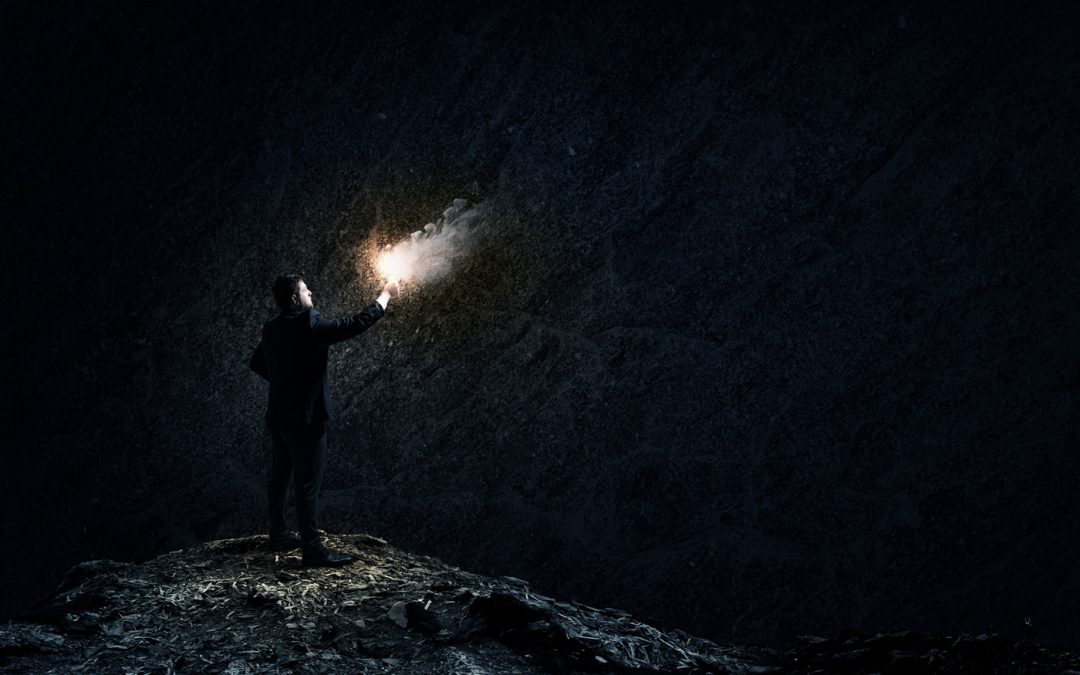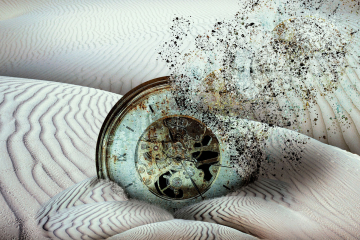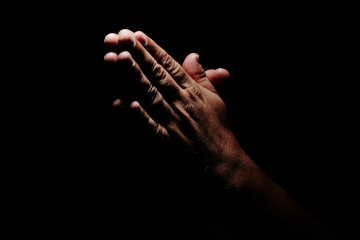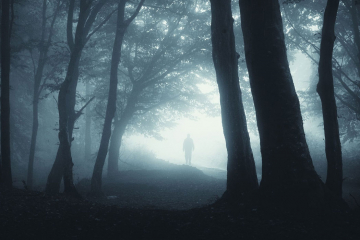Ever since I can remember noticing my feelings and moods, I had “black spots”—hours or even days when I would “disappear” into a dark and unpleasant hole. My life would appear pointless. My happiness but a memory.
I remember lying wrapped in my duvet at home as a teenager, unable to move, unable to consider doing anything. Even the thought of suicide seemed pointless.
As I got older I learned about “depression”, this apparent affliction of the mind that plagued unfortunate folk and which modern medicine had little cure for.
I never liked the word. I never thought of myself of suffering from its disease. I still don’t. Because I think the medical model is the wrong context for its definition.
But as I’ve grown older I have come to realise that am indeed predisposed to a tendency for “blackness”. It can strike as if from nowhere and lay me out. The duration and regularity has reduced. The understanding of its nature increased. But its presence endures.
2018 was a dark year for me. One of the toughest in memory, and yet one where I seemed to remain “awake” in a way I had not in previous dark episodes. And so I sought answers to the question of the nature of this blackness.
It was during a long and extended depression that the Quaker teacher and author Parker Palmer turned to help from a therapist. These words, uttered to him by that therapist, had a dramatic effect on me when I heard them.
“Parker, you seem to look upon depression as the hand of an enemy trying to crush you. Do you think you could see it instead as the hand of a friend pressing you down onto ground on which it is safe to stand?”
Was this a clue as to the nature of depression? It grabbed my attention. I thought about it a great deal. At the very least it gave me an alternative to the “imbalance in brain chemistry” explanation for my plight.
It is only with the light of retrospect that I see what I went through more clearly—an underworld journey of depression.
Down into the depths of the dark
I am being pushed down.
I go under, into the dark beneath of dreams and demons where I am placed face-to-face with that which I most fear—the great dragon—an initiation from which I must emerge changed.
It is not a happy place. I am not a happy man within in. It hurts. It dissolves my crutches. It submerges me in everything I have set up my life to avoid.
The pain is not optional. It is the ground of the underworld journey. The resistance seemingly inevitable—the understandable reaction to such an un-consensual plunge into the dark. My incompetence in the face of it all is the very reason the journey is necessary.
I am being remoulded.
7 Strategies to enlighten the dark path
My challenges last year were such that my old strategies fell woefully short. I had to learn new ways to walk this journey, for that is exactly what it is—an archetypal quest that takes us down into the dark, which asks you to face what most scares you, yet simultaneously gives you what you most need, and then propels you back up through the integration of your experiences, back into the world—changed and remoulded.
Some of the things I learned were philosophical—changes in frame that enabled me to see my plight in a light that gave me hope and trust.
But many were practical—behaviours and practices that enabled me to walk the dark road without being crushed by the enemies of the psyche.
So, here, in no particular order, are seven practical strategies that I learned to use.
If you too find yourself enveloped by the darkness of depression, I hope they bring light into the darkness, and make it the sacred journey it actually is, rather than the tumbling down into the abyss of despair that it so easily manifests as.
1. Smile.
Literally.
Make your face smile, then hold it, longer than feels “authentic”. Have your emotions as you do so. It can be quite the trip.
I remember riding my bike through Amsterdam past the museums. I set my target at the lights, 100 meters ahead. “Smile all the way there” I said to myself.
By the time I arrived, I’d indeed been on quite a ride. I’d felt like an idiot 3 times. I’d wanted to reach out my hand and smack the tourists as I swept past. I’d giggled at the absurdity of it all. I’d felt like a fraud. And then I arrived. And I was happier.
This is the trip. You do get happier.
The nervous system follows the body.
It’s not necessarily enduring. It’s not necessarily “authentic”. It’s not even necessarily fun.
But it disrupts the insidious assumption that life is shit, and you don’t know what to do to fix it. Smiling fucks with your default depressive mode.
And more often than you might think, after clamping on the stupid fucking smile, you look up at the sky, notice the birds are singing, and feel grateful to be alive.
2. Set yourself goals (yes, it works).
Never underestimate the power of doing. Goals align your actions. Actions create results. Results make you feel better.
At the very least, you occupy yourself and have less time to commiserate with yourself about how fucked life is.
There’s a secret about the human mind that psychologists discovered last century. It’s not the attainment of your goals that gives you “positive emotion” (makes you feel good), it’s setting meaningful goals, and watching yourself progress toward them.
We can endure the most miserable pain if we can see progress being made—that there is light at the end of the dark tunnel.
A word of caution: there can be a danger with the big and audacious goals—the “I’m going to change the world” variety. You say something outrageous, people applaud, you get the initial dopamine hit of “possibility”. And then it’s all followed by the miserable confirmation that you’re definitely incapable of improving your life, when you inevitably fall short of your crazy dream.
So small is usually the place to start. You’ve got to feel moved by a goal. But it doesn’t have to be hairy and audacious.
“Go for a walk outside twice a week.”
“Buy some new slippers.”
Only set goals that carry meaning for you (when you imagine their completion it feels good), and that you’re fairly confident you can achieve (this is not about ambition, it’s about small degrees of progress.)
Set 3 goals for the next month. Write them out on a big bit of paper with empty tick boxes next to them and pin them on your notice board.
Sometimes I cried when I ticked off goals. “I can do this.” I said to myself as I saw that slow and humbling progress toward the light.
3. Move—you’re on a journey.
Your body. In any way. Roll your shoulders. Shake off the stiffness. Dancing to 80s disco can work very well.
Bodywork. Breathing. Walking in nature.
You’re on a journey. The descent into the underworld is a journey older than Adam. Even though yours may be metaphoric rather than physical—the archetypal pattern is the same. You are moving from one place in life to another, through the darkness that depression forces you to confront.
And while it may be more of a symbolic or psychological journey—your body does not know this. It needs to feel that it is moving—that you are moving—that you are walking the path.
So walk. Move. Walk around your living room with the curtains drawn. Walk in the woods. Travel to another city and walk its streets.
You need to give your earthly self the physical journey it is wired to undertake. We are made to walk the land.
4. Confess—you’re inadequate.
You can’t correct the spiritual course of your life—you can’t face that which the journey requires of you—without confessing your inadequacy.
Your suffering is in part a function of your incompetence. You don’t know how to do this. This is by design. It’s not something to be ashamed of (though you will inevitably feel it is).
The one that emerges from the underworld is the one that has faced the dragon and been changed as a consequence. That you do not know how to face the dragon is the point. You are incompetent in the face of this new challenge. And the compulsory first step is to confess your failures, your fears, your shame.
You must speak it out. You must name your pain.
To a friend.
To yourself.
To God.
This is the vulnerability that underlies the courageous act.
“I’m scared. I don’t know if I can make it. My whole life feels like a sham.”
This is part of the dragon you must meet.
Shame cannot exist with words wrapped around it. Darkness cannot exist within the light.
You must confess. It is the truth that reveals the path of reconsolidation and re-alignment of what is most important.
5. Treasure and guard your insights
There were long stretches of time, months sometimes, when I could see almost no light—no hope and positivity. The creative visionary capacity that I had come to rely on in my life was “off line” and nothing I did turned it back on.
And so the moments when the clouds parted, and I had meaningful insights were stark in contrast to the seemingly eternal darkness. The moment, walking in the forest, when the sun shone through the clouds and I saw that my core practice was “being present to the moment”.
It was in these rare moments of insights that I would fight back against the fog that wanted to swirl back in and block my view. I would turn on the voice recorder on my phone and diligently speak out what I was seeing, knowing that the break in the darkness would be brief.
I would write down my insight, with as much precision as I could manage, and pin it to the board above my desk. I wrote it down, so it wouldn’t slip away like a forgotten dream.
It felt like the “conscious me” was leaving clues for the “submerged me”.
This is the power of words—the treasures of insight. Capture them, so they can lead you along the path that you lose sight of in the darkness that follows.
6. Play, play, play.
I played Pandemic Legacy (the best board game ever made) with my family. I worked my way through a lot of PlayStation games. I goofed around with my step kids.
My mum (in her infinite wisdom) told me I needed to play more. She sent me an email of 20 things I could do that would be fun. And I (in my infinite rebellion) did none of them, but took the hint, and made sure I had some fun in my own way.
Without some pleasure—the colour of life—reality becomes grey, and then black.
I remember sitting in my home office with the blinds down, reading existential poetry and feeling like it was all over. My fiancée Suuske called up to me.
“Babe. Just come downstairs. I’m making dinner and I’ve put the PlayStation on for you.”
I cried. And I did go downstairs. And I forgot how black the world was while I killed ghosts and found lost treasure playing The Witcher 3 (which is without doubt one of the best video games ever made).
7. Basic love.
Eat food.
Have baths and showers.
Put on clean clothes.
Tidy the kitchen.
Go outside.
Sometimes it was all I could manage to haul myself out of the malaise and get in the shower.
The crushing weight of life was far too much to bear. I couldn’t handle the thought of what I had to do. I didn’t want today, let alone tomorrow and the rest of my life. But the next 10 minutes? That feels possible.
“A shower. I can do that.”
I shrink the future down into the smallest chunk I can manage. I pull off my clothes, step under the stream and wash away the dirt.
And then as I’m drying myself it’s a little bit easier to go and make some food afterwards. And then it’s a little bit easier to get out my journal. And then it’s a little bit easier to face the rest of the day.
It’s an underworld journey
You are being taken down—pushed down—into the underworld.
It’s not a malfunction to be medicated. It’s an existential initiation to pass through.
It’s a journey into the darkness you do not know how to face.
It’s the unknown territory that must be navigated with as much willingness as you can muster.
Can you hear it? It is the cry of the Great Mother.
“Come down! I want a word with you.”
She demands that you face the demons that plague you—enlighten the dark places that terrifies you—so the repressed power they contain is returned to you in enlightened conscious form.
I’m lying in my bed, gripped by a fear so deep I can’t get out from under it. “Oh fuuuuck. I think I might have gotten it wrong. There is no grand plan. No archetypal meaning.
Our stories and philosophies are built on air. It’s all just a baseless construct—arbitrary ideas that we humans have woven into a story that distracts us from the truth—we’re just a random biological accident.
It’s all a mirage—life is pointless. It has no point—no ultimate destination. I have no point.”
With the light of retrospect, it makes perfect sense. If there is anything that characterises my nature, it’s the belief that we are here for a reason—that we are the conscious unwinding of the divine seed in the great pattern of God.
In the depths of my despair, I had to content with the exact opposite of this faith. And not just think about it, but feel it, in every cell of my body.
I had to face the dark truth of that possibility, and slay its treacherous intent. And as a consequence, I can now see the way we do construct baseless and arbitrary ideas to distract us from the anxious feeling of pointlessness and meaninglessness.
But this behaviour is not the deep truth, it’s the affliction that hides the deep truth.
The deep truth is that we are here for a reason.
There is a deep pattern to life.
We are the children of God.
And we matter so much more deeply than we dare believe.





Join the conversation